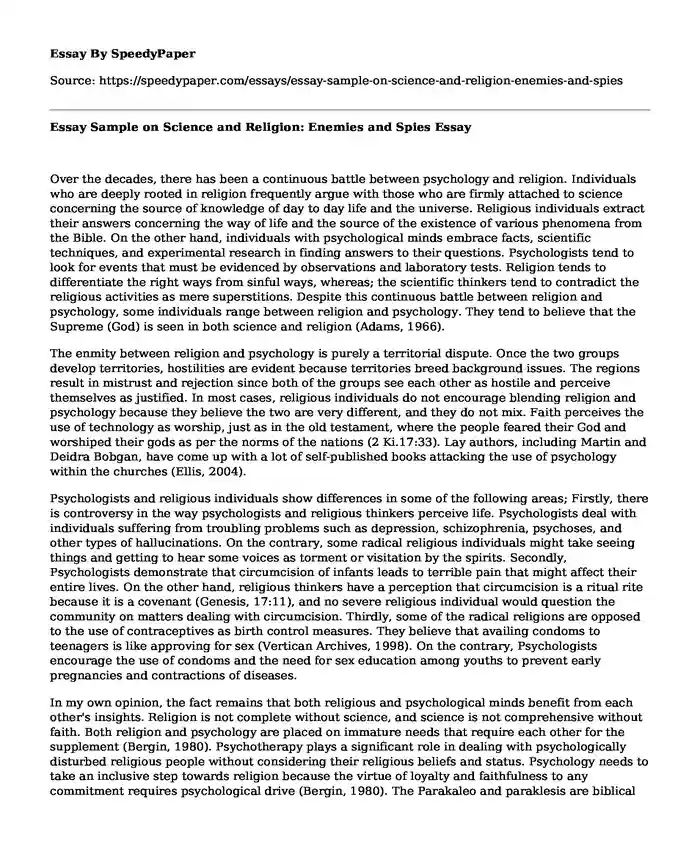
| Type of paper: | Essay |
| Categories: | Psychology Religion |
| Pages: | 3 |
| Wordcount: | 701 words |
Over the decades, there has been a continuous battle between psychology and religion. Individuals who are deeply rooted in religion frequently argue with those who are firmly attached to science concerning the source of knowledge of day to day life and the universe. Religious individuals extract their answers concerning the way of life and the source of the existence of various phenomena from the Bible. On the other hand, individuals with psychological minds embrace facts, scientific techniques, and experimental research in finding answers to their questions. Psychologists tend to look for events that must be evidenced by observations and laboratory tests. Religion tends to differentiate the right ways from sinful ways, whereas; the scientific thinkers tend to contradict the religious activities as mere superstitions. Despite this continuous battle between religion and psychology, some individuals range between religion and psychology. They tend to believe that the Supreme (God) is seen in both science and religion (Adams, 1966).
The enmity between religion and psychology is purely a territorial dispute. Once the two groups develop territories, hostilities are evident because territories breed background issues. The regions result in mistrust and rejection since both of the groups see each other as hostile and perceive themselves as justified. In most cases, religious individuals do not encourage blending religion and psychology because they believe the two are very different, and they do not mix. Faith perceives the use of technology as worship, just as in the old testament, where the people feared their God and worshiped their gods as per the norms of the nations (2 Ki.17:33). Lay authors, including Martin and Deidra Bobgan, have come up with a lot of self-published books attacking the use of psychology within the churches (Ellis, 2004).
Psychologists and religious individuals show differences in some of the following areas; Firstly, there is controversy in the way psychologists and religious thinkers perceive life. Psychologists deal with individuals suffering from troubling problems such as depression, schizophrenia, psychoses, and other types of hallucinations. On the contrary, some radical religious individuals might take seeing things and getting to hear some voices as torment or visitation by the spirits. Secondly, Psychologists demonstrate that circumcision of infants leads to terrible pain that might affect their entire lives. On the other hand, religious thinkers have a perception that circumcision is a ritual rite because it is a covenant (Genesis, 17:11), and no severe religious individual would question the community on matters dealing with circumcision. Thirdly, some of the radical religions are opposed to the use of contraceptives as birth control measures. They believe that availing condoms to teenagers is like approving for sex (Vertican Archives, 1998). On the contrary, Psychologists encourage the use of condoms and the need for sex education among youths to prevent early pregnancies and contractions of diseases.
In my own opinion, the fact remains that both religious and psychological minds benefit from each other's insights. Religion is not complete without science, and science is not comprehensive without faith. Both religion and psychology are placed on immature needs that require each other for the supplement (Bergin, 1980). Psychotherapy plays a significant role in dealing with psychologically disturbed religious people without considering their religious beliefs and status. Psychology needs to take an inclusive step towards religion because the virtue of loyalty and faithfulness to any commitment requires psychological drive (Bergin, 1980). The Parakaleo and paraklesis are biblical models that can be extracted and used for counseling. They serve as gifts to the church (Romans 12:8). Both religious individuals and psychological theorists should not reject or create mistrust between them just because of bad personal experiences. Still, instead, they should be careful not to be hijacked by individuals who endorse false doctrines that might lead to spiritual and psychological problems.
References
Adams, J., Brunell, T. L., Grofman, B., & Merrill, S. (2010). Why candidate divergence should be expected to be just as great (or even greater) in competitive seats as in non-competitive ones. Public Choice, 145(3-4), 417-433. doi: 10.1007/s11127-009-9573-1
Bafumi, J., & Herron, M. C. (2010). Leapfrog representation and extremism: A study of American voters and their members in Congress. American Political Science Review, 104(3), 519-542. doi: 10.1017/S0003055410000316
Burden, B. C. (2004). Candidate positioning in US congressional elections. British Journal of Political Science, 34(2), 211-227. doi: 10.1017/S000712340400002
Cite this page
Essay Sample on Science and Religion: Enemies and Spies. (2023, May 14). Retrieved from https://speedypaper.com/essays/essay-sample-on-science-and-religion-enemies-and-spies
Request Removal
If you are the original author of this essay and no longer wish to have it published on the SpeedyPaper website, please click below to request its removal:
Popular categories




